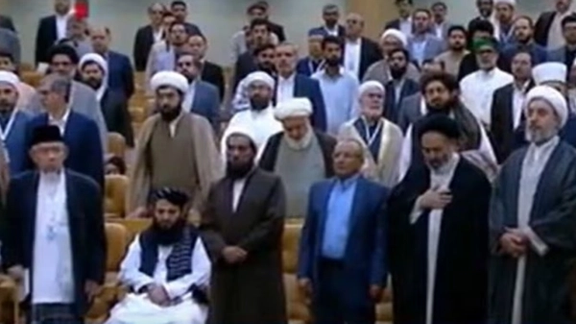Taliban official Azizorrahman Mansoor's refusal to rise during the playing of the Islamic Republic's anthem on Thursday had sparked backlash from Iranian officials.
Since then, Mansoor has apologized through a formal video statement.
"In our homeland, we sit when the song is played, and I have acted according to this custom," Mansoor stated in the video, expressing his remorse.
Following the incident, Iran's Foreign Ministry summoned the ambassador overseeing the Afghan Embassy. According to reports from Iranian domestic media, the acting head of the Afghan mission underscored his nation's deep respect for the Islamic Republic of Iran, clarifying that the act in question was purely personal and did not reflect the official stance of Afghanistan.
Tehran's special representative for Afghanistan, had also condemned the Taliban official's actions, calling it a "disrespect to diplomatic principles."
"Disrespecting diplomatic principles under the pretext of a Sharia-based prohibition on music has no foundation or validity," Hassan Kazemi Qomi wrote on X.
Mansoor, a member of the Islamist militant group's Ministry of Guidance, Hajj, and Endowments, led the Taliban's delegation to Tehran for the 38th "International Islamic Unity Conference."
A similar incident took place in Peshawar, Pakistan, where Taliban diplomats remained seated during Pakistan’s national anthem at an official ceremony.
Pakistan's Ministry of Foreign Affairs strongly condemned the act, with a spokesperson stating, "We will convey our strong protest to Afghan authorities in Islamabad and Kabul."
The acting Taliban ambassador in Islamabad was summoned and warned that Pakistan would respond firmly to such "offensive behavior."
The Taliban’s Consul General in Peshawar later explained that he remained seated during the anthem due to the inclusion of music, insisting there was "no intent to disrespect or demean Pakistan's national anthem."
The backlash from Iranian politicians included a sharp response from Mohammad Ali Abtahi, a prominent "reformist" and senior aide to former President Mohammad Khatami.
Writing on X, Abtahi stated, "The Taliban's disrespect towards the national anthems of Pakistan and Iran, and their refusal to stand, has ideological roots." He further warned, "When we say that the Taliban's ideology is more dangerous than the thousands of weapons they have, this is what we mean."
Abtahi described the Taliban's rigid mindset, which views music as entirely forbidden, as one that "destroys religion and people's lives wherever it spreads," adding that "geography doesn't matter."
He emphasized that "the majority of Muslims everywhere, including in Iran, do not seek unity with the Taliban." Criticizing the Unity Conference in Tehran, he declared, "The organizers have no right to allow the Taliban, whether in the front or the back rows, to participate in this conference."







